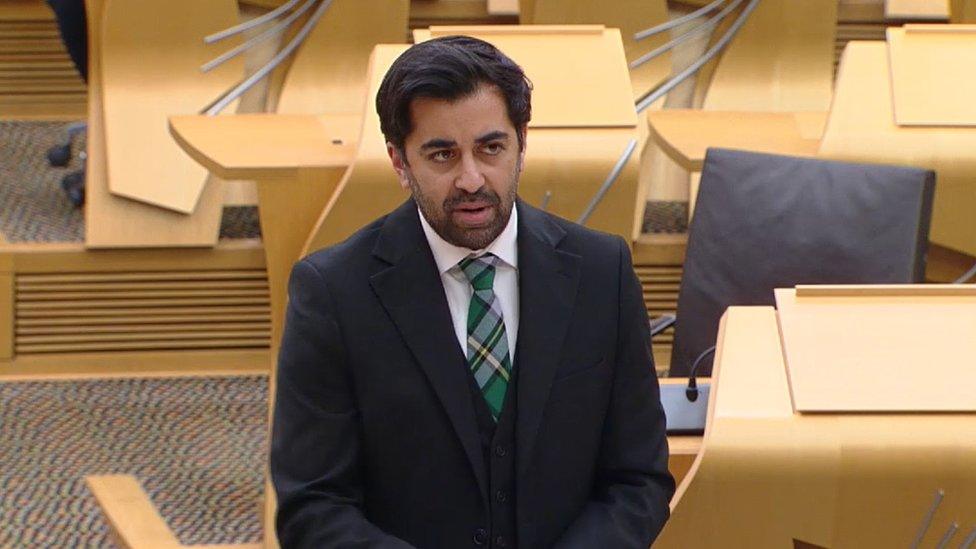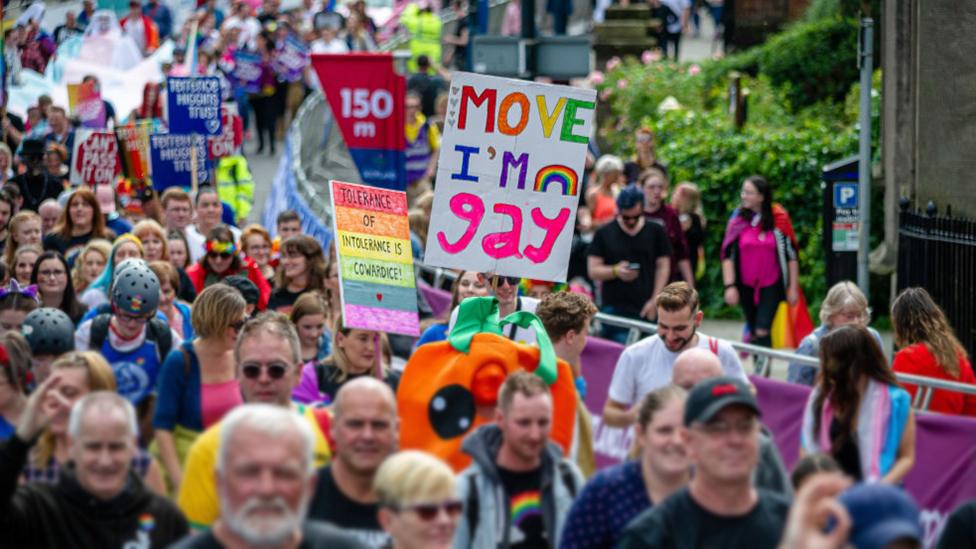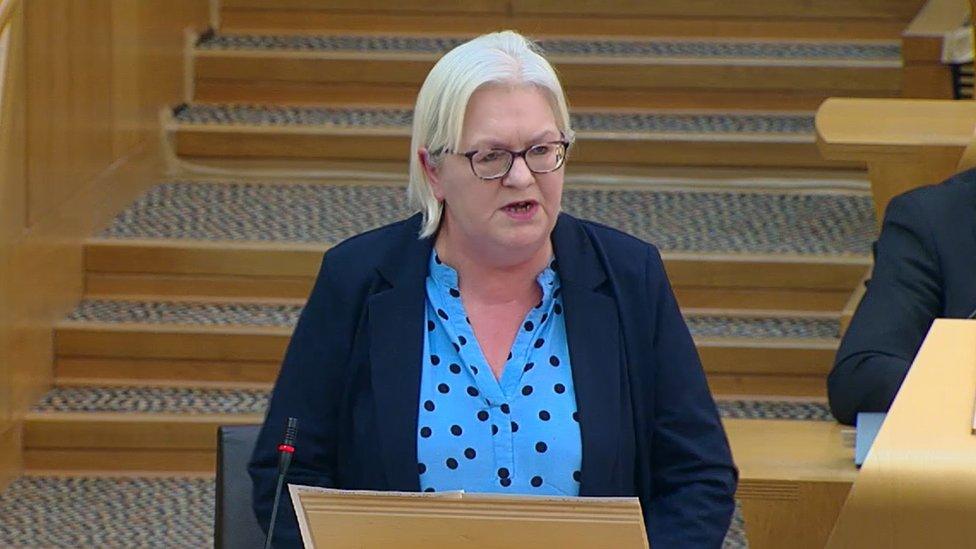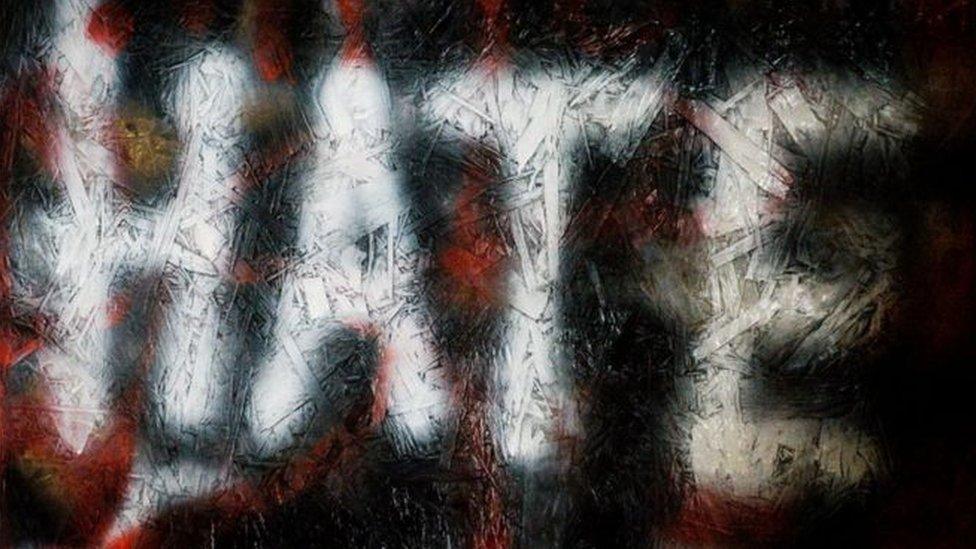Hate crime vote delayed after marathon Holyrood debate
- Published

Justice Secretary Humza Yousaf insisted he had addressed concerns about freedom of speech
The final vote on Scotland's controversial new hate crime law has been delayed as MSPs debated a raft of amendments.
The legislation consolidates existing law and extends protection for vulnerable groups with a new offence of "stirring up hatred".
The government accepted some changes but most amendments were rejected during a five-hour Holyrood session.
Due to lack of time the final debate and vote are expected on Thursday.
Two amendments designed to strengthen the protection of free speech were passed unanimously by MSPs.
But another amendment from MSP Johann Lamont that would have included women as a protected group under the legislation was defeated.
The government has instead set a working group to look at whether misogynistic abuse should be a separate crime.

The legislation extends protection for vulnerable groups with a new offence of "stirring up hatred"
The Hate Crime and Public Order (Scotland) Bill was first introduced last April in response to an independent review of Scotland's hate crime laws, external by Lord Bracadale, but has sparked fierce debate.
Under the bill, offences are considered "aggravated" - which could influence sentencing - if they involve prejudice on the basis of age, disability, race, religion, sexual orientation, transgender identity or variations in sex characteristics (sometimes described as "intersex" physical or biological characteristics).
It also creates new offences of "stirring up hatred" - which previously applied only to race - and abolishes the offence of blasphemy which has not been prosecuted in Scotland for more than 175 years.
What are the concerns?
An early draft of the bill was criticised by the Law Society of Scotland for having a perceived low threshold for prosecution.
Religious and cultural groups also raised concerns about its impact on free expression.
Writers - including crime novelists Val McDermid and Christopher Brookmyre - artists, journalists and campaigners wrote an open letter, external raising fears that a "well intentioned" law would have "unintended consequences".
The Scottish Police Federation said it would result in officers "policing speech", external and could undermine the legitimacy of the police in the eyes of the public.
The Scottish government responded by modifying the wording and strengthening freedom of expression provisions.
The changes meant "stirring up hatred" would only be considered an offence if it was intentional.
Justice Secretary Humza Yousaf said he was satisfied that these safeguards ensured there was a very high threshold for prosecution.
Offensive but not threatening
During Wednesday's session, MSPs accepted an amendment from Conservative Adam Tomkins that meant behaviour could be judged reasonable even if it might "offend, shock or disturb", in line with article 10 of the European Convention on Human Rights.
Mr Tomkins said: "If you want to argue, even if you want to campaign robustly for women's sex based rights, if you want to argue that sex is immutable, if you want to argue that sex is binary, you are not committing a hate crime, even if someone else is offended or shocked or disturbed by what you have to say, even if someone else is very upset and accuses you of transphobia.
"You are not committing a hate crime unless you cross that threshold of saying something that is not only offensive, but saying something that a reasonable person would hold to be threatening or abusive in a manner that intends to stir up hatred."
Mr Yousaf also proposed an amendment which said that "antipathy, dislike, ridicule or insult" of religions or those who hold religious beliefs would not by itself constitute threatening or abusive behaviour.
Protection for women

Johann Lamont wanted women included in the law when abuse was directed at them on the basis of their sex
Former Scottish Labour leader Johann Lamont wanted "sex" added as a protected characteristic, arguing that women were often the target of hate crime.
But the government has rejected this, instead establishing a working group to look at whether a separate criminal offence covering misogynistic abuse should be created.
This group, led by QC Baroness Helena Kennedy, is due to report within a year.
Adam Tomkins and fellow Conservative Liam Kerr failed to secure a majority for an amendment which they claimed would protect conversations that took place "wholly in private".
They argued that heated discussions, for instance at the family dinner table, should not result in people being prosecuted for their personal views.
"We all need a safe space where we can let off steam," Mr Tomkins said.
But Mr Yousaf said the law should provide comprehensive protection, and such comments could have wider effects beyond the four walls in which they take place.
He also warned that groups could use this as a loophole by meeting in someone's home.
Presiding Officer Ken Mackintosh said the final debate and vote would take place on Thursday, subject to confirmation by the parliamentary bureau.
Related topics
- Published24 April 2020
